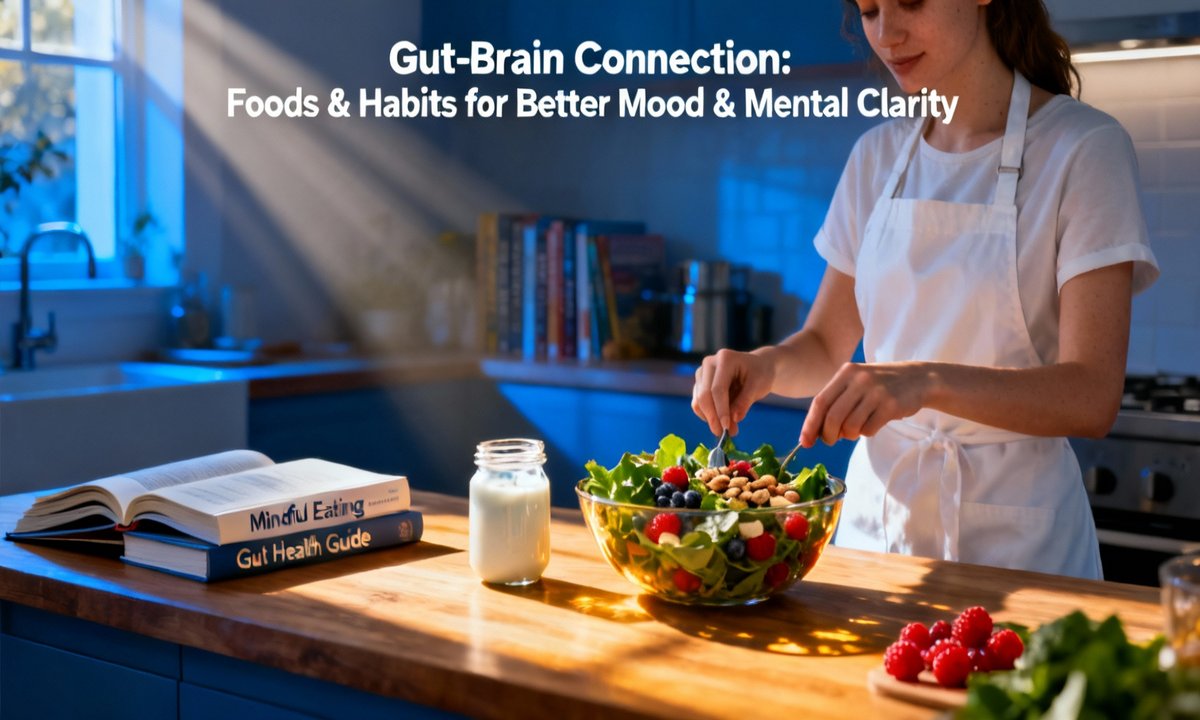The intricate connection between your gut and brain is far more profound than many realize. You might have noticed how stress can manifest as digestive discomfort, or how certain foods can leave you feeling mentally foggy. These experiences are not coincidental; they highlight the powerful communication network known as the gut-brain axis. By prioritizing the health of your gut, you can positively influence your mood, enhance your focus, and contribute to your overall mental well-being in the long term.
Gut-Brain Connection: Nurturing Your Mood and Mental Clarity
Understanding the Gut-Brain Axis
Scientists have increasingly recognized the deep link between your gastrointestinal tract and your brain. This constant, two-way communication system is called the gut-brain axis. It plays a crucial role in regulating a wide array of bodily functions, from the most basic digestive processes to complex emotional responses. Understanding this connection is key to unlocking better mental and physical health.
The Two-Way Street Between Your Gut and Brain
The gut-brain axis operates through a sophisticated network involving hormones, immune signals, and even direct nerve connections. This constant dialogue means that what happens in your gut can directly impact your brain, and vice-versa. It’s a complex interplay that affects how you think and feel daily, extending beyond simple psychological responses. Research from Harvard Health sheds more light on this fascinating connection.
The Role of Your Microbiome
Within your digestive tract resides trillions of bacteria, collectively known as the gut microbiome. These microscopic residents are not just passive inhabitants; they are active participants in your health. They assist in breaking down food and are instrumental in producing vital neurotransmitters. Chemicals like serotonin and dopamine, essential for feelings of happiness and clear cognitive function, are largely manufactured here. A balanced gut ecosystem is often a precursor to sustained mental well-being, with up to 90% of your serotonin potentially originating in your gut.
Recognizing Signs of Imbalance
How can you tell if your gut-brain connection might need some support? There are several common indicators. These include experiencing frequent brain fog, noticeable shifts towards a low or anxious mood, or persistent digestive discomfort such as bloating or irregularity. An increased craving for highly processed foods could also be a subtle sign. If these symptoms resonate with you, your gut might be sending signals that it’s out of sync, and simple dietary or lifestyle adjustments could help restore harmony.
Fueling Your Gut for Optimal Mental Well-being
The food choices you make serve as a powerful tool for supporting both your brain and gut health. Focusing on specific categories of nutrients can significantly impact your mental clarity and mood. By consciously selecting foods that nourish your gut, you empower its beneficial bacteria and bolster the production of mood-regulating compounds.
Beneficial Foods to Embrace
To cultivate a thriving gut environment, consider incorporating a variety of beneficial foods into your daily meals. These foods provide the necessary building blocks and sustenance for a diverse and healthy microbiome. Making these conscious choices can contribute significantly to your overall sense of well-being and a healthier gut-brain axis.
Prebiotic-Rich Foods
Prebiotics are specialized fibers that act as nourishment for the friendly bacteria residing in your gut. Integrating foods like bananas, onions, garlic, asparagus, and oats into your diet can encourage a diverse and robust microbiome. These simple additions can make a substantial difference in your gut health. For meal inspiration, explore delicious, budget-friendly options that include gut-healthy ingredients at Budget-Friendly Meal Prep: Delicious Dinners Under $5 Per Serving for Busy Weeks.
Probiotic Foods
Probiotics introduce live, beneficial bacteria directly into your gut. Regular consumption of foods such as yogurt, kefir, kimchi, sauerkraut, and miso can effectively boost your gut’s population of ‘good guys.’ A healthy influx of these beneficial bacteria is often associated with an uplifted mood and improved digestive function, reinforcing the gut-brain connection.
Omega-3 Fats
Omega-3 fatty acids are essential for reducing inflammation throughout the body, including the gut and brain. Foods like fatty fish (salmon, sardines), walnuts, and chia seeds are excellent sources. These healthy fats facilitate better communication along the gut-brain axis, potentially leading to greater emotional stability and cognitive health.
Polyphenol Power
Polyphenols are potent antioxidants found in a variety of plant-based foods. Berries, green tea, dark chocolate, and extra-virgin olive oil are particularly rich in these compounds. Polyphenols not only protect your brain cells from damage but also support the diversity of microbes within your gut. Consider incorporating berries into your snacks or meals, perhaps using ideas from Plant-Based Power: Easy & Flavorful Vegan Recipes for Healthy Weeknight Meals.
Foods to Minimize for a Healthier Gut
Just as some foods support gut health, others can disrupt the delicate balance of your gut bacteria and negatively impact the gut-brain axis. Reducing your intake of these items can lead to significant improvements. Aim to minimize foods high in added sugars, artificial sweeteners, and those that are highly processed or heavily fried.
By limiting these potentially disruptive foods, you may experience fewer cravings, increased energy levels, and a reduction in sudden mood crashes. Learning more about making informed food choices can be incredibly beneficial. Discover strategies for optimizing your grocery budget and healthy eating habits in our Budget-Friendly Living: Your Ultimate Guide to Saving Money on Groceries.
Lifestyle Habits for a Thriving Gut-Brain Connection
While nutrition is a cornerstone of gut health, lifestyle choices also play a pivotal role in maintaining a balanced gut-brain axis. Integrating mindful habits beyond diet can significantly enhance your digestive well-being and, consequently, your mental state. These practices work synergistically to support a healthier you.
The Importance of Restful Sleep
Inadequate or poor-quality sleep can significantly disrupt the beneficial microbes in your gut and negatively impact your mood. Aiming for 7–8 hours of restful sleep each night is crucial for supporting both your digestive system and your emotional balance. Prioritizing consistent sleep routines can have a profound effect on your overall well-being. Practical tips for preparing meals in advance, which can alleviate evening stress and promote better sleep, can be found in our guide Master Your Kitchen: 5 Must-Have Tools for Quick & Easy Everyday Recipes.
Integrating Mindful Movement
Engaging in gentle, regular exercise is beneficial for more than just your physical fitness. Activities like walking, yoga, or cycling not only uplift your spirits but also stimulate gut contractions and encourage the growth of beneficial bacteria. Try to incorporate at least 30 minutes of movement into your daily routine, even if it’s broken into shorter, manageable bursts throughout the day.
Managing Stress Effectively
Chronic stress is a known disruptor of gut balance, often leading to digestive issues and contributing to low mood. Developing a personalized toolkit of effective stress-management strategies is therefore essential for nurturing your gut-brain axis. Simple techniques such as deep breathing exercises, taking mindful breaks during your workday, or spending time in nature can make a significant difference in mitigating stress’s impact.
Creating a Supportive Home Environment
Your immediate surroundings exert a subtle yet impactful influence on the health of your gut-brain axis. By curating a home environment that promotes calmness and natural living, you can further support your digestive health and mental clarity. Simple adjustments to your living spaces can contribute to a more harmonious internal state.
Harnessing Natural Light and Fresh Air
Regular exposure to daylight and ensuring good air circulation within your home can significantly boost serotonin levels. This practice also supports microbial diversity in your gut. Introducing houseplants can further enhance air quality and brighten your mood. For ideas on incorporating greenery, explore Boost Your Home’s Air Quality: Top 7 Indoor Plants for a Healthier Living Space and Green Thumbs for Beginners: The Easiest Indoor Plants and How to Keep Them Alive.
Embracing Clean and Minimal Spaces
Decluttering your living areas and opting for natural cleaning products can minimize exposure to environmental toxins. This approach benefits both your mind, by reducing visual clutter, and your gut, by limiting chemical intake. A clear, natural home environment can foster a sense of calm and clarity. Discover practical strategies for tidying and toxin-free cleaning in Declutter Your Home: Essential Storage Solutions for Every Room and Sparkling Home, Green Living: DIY Natural Cleaning Recipes for Every Room.
Balanced gut bacteria produce and modulate neurotransmitters like GABA and serotonin, which are crucial for stabilizing your mood and sharpening focus. This means supporting your digestive health directly influences your brain’s performance in areas like memory, concentration, and emotional resilience. Scientific reviews from the NIH further underscore this connection.
Everyday Strategies for a Stronger Gut-Brain Link
Integrating small, consistent practices into your daily routine can significantly strengthen the connection between your gut and brain. These actionable steps are designed to be easily incorporated, offering tangible benefits for your mood, focus, and overall well-being. Consistency is key when nurturing this vital axis.
Simple Routines for Enhanced Clarity
Start your day by hydrating adequately; drinking water and consuming a fiber-rich breakfast can set a positive tone for your gut. Prioritize whole foods, choosing a variety of fruits, vegetables, whole grains, and legumes over packaged meals whenever possible. Breaking up screen time, perhaps with a short digital detox, can also bring clarity. Practicing gratitude through journaling or reflection helps calm stress responses, benefiting both digestion and mood.
Considering Supplements Wisely
While a diverse diet should be your primary focus, there are instances where probiotic or prebiotic supplements might be beneficial. This could be particularly true during or after antibiotic treatment, or periods of chronic stress. It is always wise to seek personalized advice from a healthcare professional before starting any new supplement regimen. When choosing supplements, look for clinically studied strains known to support both gut function and mood.
Practical Tips for Daily Gut Nurturing
To consistently nurture your gut, consider batch-cooking gut-healthy meals on weekends; our guide Mastering Meal Prep: Delicious & Frugal Recipes for the Whole Week offers inspiring ideas. Swap out sugary snacks for healthier alternatives like nuts, yogurt, or fresh fruit. Invite natural greenery into your workspace to promote calm and cleaner air. Experiment with global fermented foods to diversify your gut microbiome and palate. Additionally, spending even ten minutes outdoors daily can lower stress hormones and boost your gut flora.
When to Seek Professional Guidance
The intricate relationship between gut and mental health is multifaceted, and while lifestyle and dietary adjustments are often helpful, it’s important to recognize when professional support is needed. If you find that your mood struggles persist or worsen despite making changes, or if digestive symptoms become particularly disruptive, consulting a medical professional is advisable. Similarly, if you’re contemplating significant dietary overhauls or introducing new supplements, seeking expert advice is a prudent step.
Collaborating with a qualified nutritionist or a functional medicine physician can provide a personalized strategy tailored to your specific needs. Their expertise can ensure that your efforts lead to real and sustainable progress in both your gut and mental well-being. Do not hesitate to reach out for support when necessary.
Cultivating Long-Term Well-being
The concept of the gut-brain axis, though rooted in complex science, has a profound and direct impact on your daily life. The cumulative effect of simple shifts in your food choices, consistent sleep routines, and effective stress-management practices can significantly transform both your digestion and your mood over time. What you choose for breakfast or how you unwind in the evening holds more power than you might initially think.
Are you ready to embark on your gut-brain reset journey? Consider starting this week by introducing a new prebiotic food, decluttering a corner of your living space, or experimenting with a short digital detox. Pay close attention to the positive lift these small changes bring to both your energy levels and your overall outlook. To delve deeper into creating a holistic and healthy home environment, explore our articles on Eco-Chic Home Decor Ideas and From Bills to Bliss: Optimizing Your Home for Maximum Comfort & Savings.
We invite you to share your experiences with us. Have you noticed a positive change in your mood or mental clarity after adjusting your diet or lifestyle? Your story could inspire others on their journey toward better gut-brain health.
This article draws on robust research from the Harvard Health Blog and NIH reviews, along with insights from experts in nutrition and neuroscience, ensuring accurate and current advice. For personalized recommendations, please consult a certified professional.



